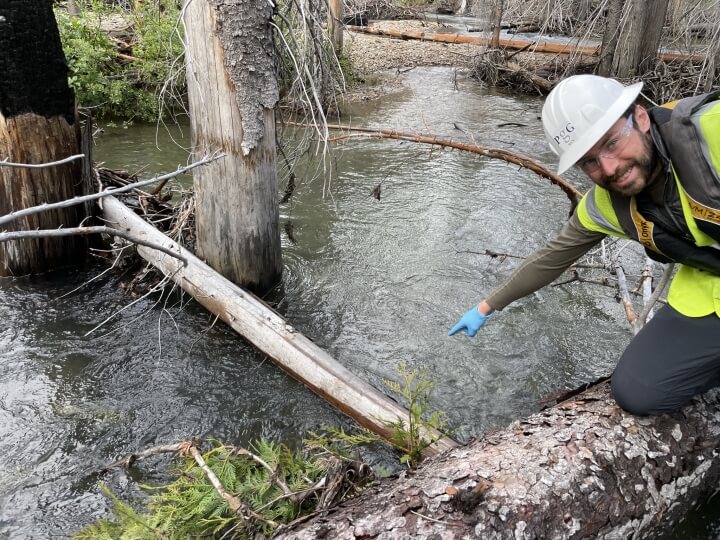Nick Waldo, A.B. '13
A conversation with the then-chair of Harvard’s environmental science and public policy concentration changed everything for Nick Waldo, A.B. '13. He was just a freshman when he attended a faculty dinner with John Briscoe, Ph.D. '76 and former Gordon McKay Professor of the Practice of Environmental Engineering at the Harvard John A. Paulson School of Engineering and Applied Sciences (SEAS). Waldo told Briscoe he wanted to use environmental science to make an impact.
“He said he’d been in the room for a lot of these big conversations, and there's always too many people who studied policy, too many lawyers,” Waldo said. “He said what we needed was more people who become really credible technical experts first, and then pivot into policy at a later point in their career. He said if I wanted to be in a room making an impactful environmental policy decision, be the engineer in the room.”
That conversation changed the entire trajectory of Waldo’s career. He switched concentrations to engineering sciences with a focus on environmental science and engineering. When he finished his undergraduate studies, he pursued a Ph.D. in environmental engineering at the University of Washington. His research focused on the effects of global climate change on wetland soil chemistry, ecology and methane emissions.
Waldo now works as a program manager in the Alaska Department of Environmental Conservation, joining his home state’s government in October 2021. His office assesses the risks of pollution to stormwater and wetlands across the state, and issues permits for a wide range of industrial projects.
“Civil service is where you get to make a decision and have it directly translate into an impact on people's lives,” Waldo said. “When you go into civil service, you can be the one who listens to all those arguments from different groups, from industry, from advocates, from nonprofits, and you can do the critical thinking of how to take all of these various interests and make the best decision from them. And then when you make that decision, you get to see how it plays out and actually impacts the real world.”
Growing up in Juneau, Waldo fell in love with nature at a young age. Hiking, camping, kayaking, Boy Scouts of America, sailing on his high school team – he loved the outdoors, even writing his college essay about his time on the national ski patrol. For their recent honeymoon, Waldo and his wife surrounded themselves with finches and giant tortoises on the Galapagos Islands.
When it came time to choose a college, Waldo wanted a school that not only would provide a great education, but offered access to the outdoors.
“I wanted someplace where on the weekends I could go and access mountains,” Waldo said. “I also wanted a school with a sailing team, because I knew college was gonna be the last time in my life that I would be in any kind of real athletic competition. Harvard checked those boxes. When I got in, it's hard to say no.”
Waldo walked onto the Harvard sailing team and spent three years on the team. At SEAS, he was part of the Harvard College Engineering Society and worked in the Harvard Environmental Technology Lab, helping construct an ultrasound reactor for water purification studies. He also was part of the Harvard Earth History and Isotope Geobiology Lab, which was part of the FAS Earth and Planetary Sciences Department.
Nick Waldo, A.B. '13, at a cleanup site in Washington
He gained further lab experience in the year after graduating, researching geology and geophysics at the Woods Hole Oceanographic Institute on Cape Cod, Mass. In 2014, he left for the University of Washington.
“Something that's probably a lesson that every undergrad at Harvard should hear and understand is that a college degree is not just about the headline of what you learn – it's about what skills you develop along the way,” he said. “When I was applying to grad school, the fact that I already had laboratory experience is what got me in.”
Waldo joined the Alaskan government after two years working as an engineering consultant in Seattle, specializing in groundwater contamination and remediation. While he enjoyed living in a big city, much of what he liked about it disappeared when the COVID-19 pandemic hit in 2021. Wanting to move somewhere with better access to nature, he joined the Alaskan government’s Contaminated Sites program.
“From the time I finished my Ph.D., I was open to government work,” he said. “Getting into civil service in the environmental policy realm was always the long-term plan. I'd also always had Juneau or someplace like it in the back of my mind: small to mid-size cities, near mountains and ideally the ocean.”
Alaska didn’t just instill a love of the environment in Waldo – it also became an example of how our actions can affect it. Glacier depletion and rising sea levels are two well-documented consequences of global warming due to climate change, and spending so much time in Alaska has made it abundantly clear to him of the danger. Controlling industrial permitting and preserving water quality might not seem like the most direct response to these challenges, but Waldo knows anything that helps conserve Alaska’s environment and ecology is a step in the right direction.
“Northern Alaska is built on permafrost infrastructure, and so we are seeing those impacts very directly,” he said. “Even in my hometown of Juneau, which has a pretty moderate climate, the biggest tourist attraction in town, which pulls in something like half a million visitors off the cruise ships every year, is the Mendenhall Glacier. It sits in a lake near downtown Juneau, very easy to access. It has shrunk back something like half a mile since I was a kid. You go there year after year, and you can see it melting back. So I would say Alaskans are very aware that the climate is changing.”
Press Contact
Matt Goisman | mgoisman@g.harvard.edu

